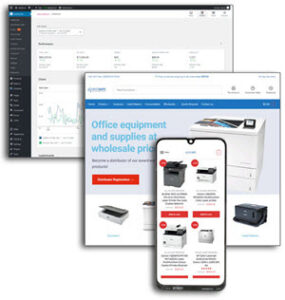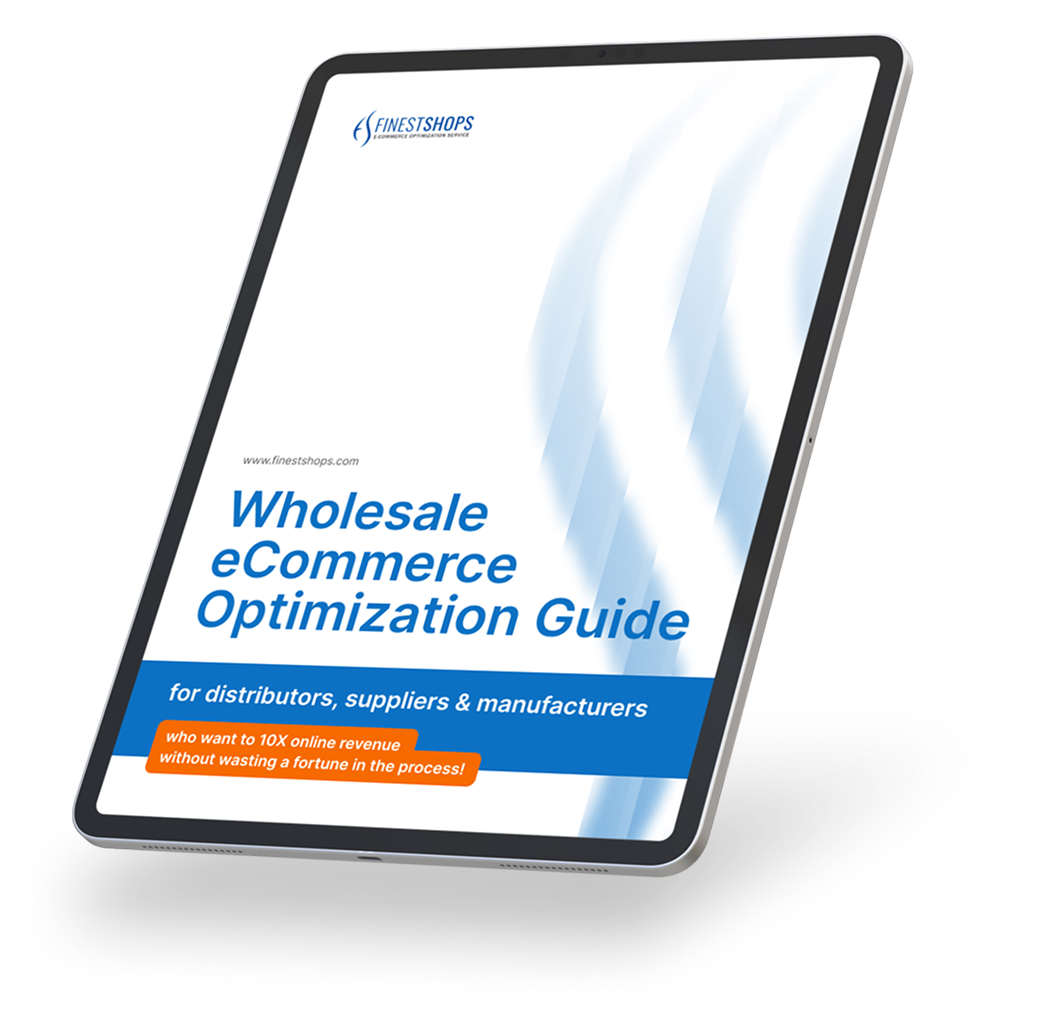 Do you want to know how to scale up your B2B sales online? The secret lies within optimizing your wholesale eCommerce setup. But knowing how to achieve this in a way that’s both efficient and cost-effective isn’t so obvious. Well, in this article I’m going to show you exactly how so you can cut costs, maximize sales, and most importantly, get ahead of your competitors.
Do you want to know how to scale up your B2B sales online? The secret lies within optimizing your wholesale eCommerce setup. But knowing how to achieve this in a way that’s both efficient and cost-effective isn’t so obvious. Well, in this article I’m going to show you exactly how so you can cut costs, maximize sales, and most importantly, get ahead of your competitors.

Hi, I’m Anton by the way. Just to let you know that we’re going to cover a lot in this article and if at some point you get lost and need some help figuring this stuff out, don’t hesitate to get in touch!
You can do this by booking a time to speak to one of our specialists who will unpack everything for you.
B2B & Wholesale eCommerce challenges
Your ability to scale up is dependent on the versatility of your eCommerce platform. The overarching goal is to transform your platform into a well-oiled machine, where every cog in the wheel turns smoothly to push visitors further down the sales funnel.
But the harsh reality is that most eCommerce platforms are built for retailers, so their functionality isn’t entirely compatible with fulfilling the requirements of business sellers. Having to operate with a platform that is rigid and inflexible will place a glass ceiling over your business’ ability to scale up, leaving you behind your competition.
Of course, if you have enough capital you can get anything you want. However, you may not have $150,000-$300,000 available to build a custom platform and spend over $24,000+ each year on something like NetSuite eCommerce, Magento Enterprise or Shopify Plus.
And even if you had the funds available, it would be difficult to achieve a strong ROI because these platforms are very expensive to maintain and will cripple your business’ ability to profit which will only drain your resources.
But what complicates things even further is how frequently these platforms need to be updated. So once you’ve acquired all of these features, your eCommerce platform may already be substandard compared with your competitors, putting you on the back foot.
Undeniably, the vast majority of these systems are both restrictive and expensive, which is why we’ve opted for a different approach when creating our Wholesale eCommerce Signature System.
The impact of these challenges
The B2B eCommerce industry is growing rapidly and is expected to exceed $20 trillion by 2027. Every day more and more businesses are turning to eCommerce as a profitable business strategy, making the industry incredibly more competitive.
Operating with a mediocre eCommerce platform will limit your business’ ability to scale up and outperform competitors, much in the same way as a 100m sprinter’s ability to compete would be handicapped by sprinting with a backpack on.
With the industry becoming more cut-throat by the day, it’s crucial for any business wanting to succeed to equip themselves with a dynamic and powerful eCommerce platform. By choosing not to, these B2B eCommerce businesses will find it almost impossible to maximize sales and overtake their competitors.
What you get with a properly set up wholesale eCommerce system
There are many eCommerce systems out there and most of them will do some of the things listed below. You can add the other parts with a separate service or you can customize your existing platform. And if you want everything in one package, we have a special system for that as well.
With a powerful and versatile wholesale eCommerce system your business will be able to:
Provide customers with more product data than your competitors do
People will be far more inclined to purchase from you if you provide them with more product information than your competitors. And so, your online catalog should have all of the data that your buyers will need to make a purchase without contacting your staff. This includes the basic data product like price, description, stock available, dimensions, weight, color, specification. In addition, you may also want to display information that will assist in the buying process, such as case studies; usage, installation, and assembly videos; user manual, technical documentation; warranty; accessories, and FAQ.
When it boils down to it, the more information you provide, the more you sell. From start to finish, your eCommerce system should make it easy for your staff to import or add this information.
Save time on processing orders
Your online portal should accept completed orders and self-serve buyers 24/7, allowing your staff to focus their attention on other areas of the business.
Item price (according to quantity and customer’s group), shipping (even LTL freight), and taxes (or tax exemption) have to be accurate to allow buyers to finish the order using a payment method of their choice (Credit card, Paypal, Amazon Pay, Purchase order, bank transfer and etc).
Reduce data entry mistakes
Any process where data has to be inserted manually by staff inevitably leads to a build-up of errors and delays. Instead, automatic data synchronization between all of your business systems will keep your buyers happy with the order fulfillment speed. With everything optimized and automated, in many cases, there is no reason not to offer same-day shipping which will put you years ahead of your competition.
Gain access to up-to-date business information for better decision making
Having accurate data analytics is key to improving your business performance. The best eCommerce systems have rich reporting capabilities that will show you how your business is performing per day, week and month and allow you to add custom reports that are specific to your business.
Improve customer retention through enhanced quality of service
Due to the pandemic, there has been a massive surge of people shopping online. Providing high-quality customer service has never been so crucial to maintaining a healthy relationship with buyers.
With your Wholesale eCommerce system, customers should be able to check their order history, track new orders with up-to-date tracking information, communicate with your staff and be able to submit an instant online message.
Strengthen your Google rankings to generate more traffic onto your website
The more visible your website is on search engines, the more new buyers you’ll onboard. The best eCommerce systems make it easier for Google to index your product pages without having to spend thousands of dollars on an SEO agency.
Boost your conversion rates
To optimize your platform for conversions you need to simplify and automate the customer’s journey. This applies to both mobile and desktop users. The elements that don’t require any maintenance but are often missed by merchants are cart recovery emails, review reminders, and back-in-stock notifications. Adding these components can bring you thousands of dollars of extra revenue every month.
Help you generate relevant content to position yourself as an industry leader
Creating content is one of the major keys to growth. It’s a powerful way to demonstrate your expertise, attract new customers and enhance the value of your brand. But creating content and distributing it across different social media channels is time-consuming.
If you have the manpower to generate the content in-house or outsource it, you’ll need a content management system to easily add new content that’s optimized for search engines.
Even if you can’t generate your own content at this time, set up an automated system that will show your customers important industry-related news on your website. Doing so will communicate that you’re active and staying on top of your industry trends.
Convert more leads into customers
Customers who abandon a purchase just short of completing it are still qualified leads. Every day, businesses lose out on thousands of dollars from not following up on these leads.
Most eCommerce systems allow you to create automation that will encourage users to complete their purchase by sending them reminders and instructions to do that (“Click here to complete your order”).
It’s also important to think about other ways your eCommerce platform can convert visitors into paying customers. For example, do you have a signup form with a special offer to increase registrations? Having these incentives to connect with your target market will help pull visitors closer to your brand and convert leads into buyers.
Now, I know we’ve covered a lot here…
So if you’re feeling confused and would like someone to unpack everything for you in more detail, feel free to book a time to speak to a member of our team.
The B2B eCommerce Industry at a glance
- The B2B eCommerce market is expected to be worth $20.9 trillion by 2027 (Research and Markets, 2020)
- 64% of B2B companies plan to increase their investments in e-commerce websites. (Digital Commerce 360, 2020)
- More than 80% of B2B businesses that participated in a survey plan to invest in an e-commerce platform to enhance the customer experience. (net solutions, 2020)
- A third of B2B buyers say that their expectations of customer experience have increased. (Accenture, 2019)
Why consider a FinestShops Wholesale eCommerce System
FinestShops have been providing eCommerce services since 2003 and have worked with over a dozen eCommerce systems. To date, we have set up and managed hundreds of stores for clients.
Many B2B eCommerce platforms cost $75,000 to $250,000 to develop and an additional $24,000+ for the annual contract, and this is just for the license and support. For many businesses, this is a large expense. That’s why we created our Wholesale eCommerce Signature System, which gives you everything you need to scale up your sales online for a fraction of that cost.
From start to finish, our Wholesale eCommerce system was built to make scaling up B2B sales as accessible as possible for business sellers. This means no expensive licenses, no maintenance costs, no per-order fees, no heavy investment, and no long-term contracts.
You’ll receive a complete eCommerce platform that gives you all of the tools you need to gain a competitive advantage in your industry, including:
- Search engine optimized catalog
- Mobile-friendly online portal
- Inventory management
- Customer self-service area
- Order and shipping tracking
- Marketing automation
- Content management system
- Automated industry news
- Customer service system for online chat and inquiries
- Available integrations with almost any third-party system
[ Click here to schedule your free Wholesale eCommerce growth session now ]
